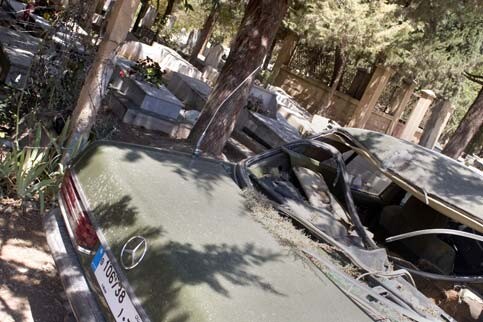Electronic Lebanon 3 August 2006

A view of Balabak village in Lebanon, bombed by Israel, August 2, 2006. (MaanImages/Raoul Kramer)
In the narrative which has transpired following the escalation of events the past three weeks, Israel has continued to make the claim to its domestic audience that they would be safer as a result of the IDF military response. In a country which has mandatory military service, its citizens have largely supported the war effort. Except for a few demonstrations in Haifa, Tel Aviv and Jerusalem, the broader public largely endorsed the actions of the Israeli government.
To say that Condoleeza Rice’s visits to the region were embarrassing for the United States would be a profound understatement. Not even the Israeli public took her presence here or her apparent calls for a ceasefire seriously.
Many in Israel were saying things like, “Hezbollah started this, now we will finish it. We have lived like this for too long.” The Israelis, in this narrative, are portrayed as the victims without looking at the occupation as one of the root causes of the conflict or one of the primary sources of tension. Even if ending the occupation will not stop Israel’s most vehement critics, it would at least assuage those who are moderate critics which would be willing to support a fair, negotiated, two-state solution.
Though Hezbollah has been slowly using up its supply of Katyusha rockets, it is still an organization which will endure far in to the future even if it takes major blows in the coming weeks. It is not a movement which requires Hassan Nasrallah as a leader.
As Israeli television showed edited musical montage moments of the war with sensational background music for effects, some Arabic channels ran propaganda videos for Hezbollah. This disconnected dual narrative, distorted by the war and designed for mass consumption, shows the depth of the disdain for each nation’s aspirations and its complete disregard for the innocent civilians that stand in the way of its ideology.
Hezbollah says, “End the occupation or the rockets will keep flying.”
Israel responds, “Until the rockets stop flying, we won’t stop the offensive.’
Discussions on prisoner exchanges have neared completion several times only to be undone by more violence.
This region is headed to a 100 year war which began with the Second Intifada and the events of September 11th. There is little evidence to suggest that there is the restraint or leadership capacity amongst those who have interests in the region to avert this course of action. Additionally, the continual series of traumas inflicted upon the region will have devastating long term implications that will be a barrier to peace. If anything, there will be increased intransigence in the coming years and hawkishness from Israel even if it is not the wisest course of action.
The Israeli military has made the calculation that largely pre-emptive wars carried out in a mass way are the most effective strategy to maintain Israeli hegemony in the region. By acting pre-emptively, they maintain their relative military strength to continue its policies domestically and within the West Bank and Gaza Strip. The European Union and the United States actively endorse Israeli strategy with a few exceptions.
Israel, as long it maintains the occupation of the West Bank and Gaza, will have little moral authority in international affairs. Without a moral position, Israel will be hard pressed to maintain the present course of its policy in the mid and long-term or maintain the support of the Western powers for long-term strategic reasons.
As television images showing the human cost of this unnecessary war begin to resonate around the world, Israel or Hezbollah will not have a moral position to justify the effects of their war on innocent civilians. No amount of ‘public relations’ or ‘political messaging’ will gloss over the very real effects of this war.
This completely unnecessary escalation will lead to more pressure on both Israel and Hezbollah to alter their policies. Neither party to this dispute has the right to continue in this direction without international opprobrium levelled at them, nor do they have the right to live in a bubble. Israel has no moral right to call itself a victim, nor does Hezbollah have the moral right to call themselves freedom fighters.
Both parties to this dispute are engaging in fundamental lies which are killing innocent civilians every day. As well, it must be understood that Israel’s military strength backed up by the United States, is causing a disproportionate number of deaths in Lebanon, the West Bank and Gaza. The US must bear some responsibility for the exercise of its foreign policy in the region.
There are wiser courses of action which Israel and the US could follow which would not lead to the same outcomes which occur with such frequency. Breaking this vicious circle means not responding in such an overwhelmingly aggressive manner as in Iraq and Lebanon. Militia movements and rogue states constantly try to draw military responses from their opposition. It is one of their most effective tactics. To be drawn in to such campaigns, is to not understand the law of diminishing returns and the relative inefficiency of such actions towards meeting strategic ends.
Am Johal is a freelance writer from Vancouver, Canada who worked during 2004 in international advocacy with the Mossawa Center, the Advocacy Center for Arab Citizens of Israel.
Related Links





